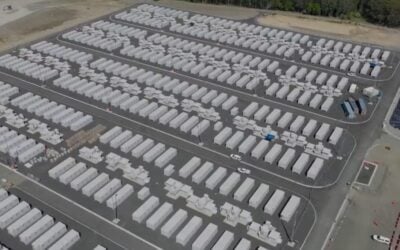
A regional council in Germany has given the go-ahead for transmission system operator (TSO) TransnetBW’s 250MW Grid Booster BESS project, which will be provided by system integrator Fluence.
Stuttgart council has issued a planning approval decision for the construction and operation of the 250MW/250MWh battery energy storage system (BESS) project in Kupferzell, in the state of Badden-Wurttemberg, where TransnetBW operates the grid.
It marks the formal completion of the approval process and means shipments and construction of the BESS can begin, with deliveries from Fluence expected to begin this year. The approval of the construction site had already occurred in August 2023, and a groundbreaking ceremony is expected in June 2024. The project is scheduled to be online in 2025.
The BESS will act as a strategic network node along a transmission line, mimicking the line’s injection or absorption of power into the system. That will prevent the need for extra transmission line investment, as well as allow TransnetBW to operate the line’s more efficiently.
Try Premium for just $1
- Full premium access for the first month at only $1
- Converts to an annual rate after 30 days unless cancelled
- Cancel anytime during the trial period
Premium Benefits
- Expert industry analysis and interviews
- Digital access to PV Tech Power journal
- Exclusive event discounts
Or get the full Premium subscription right away
Or continue reading this article for free
It can also act as a safety buffer in the event of a fault by replacing the power a transmission line would provide, reducing the need for an extra line.
The news follows another of Germany’s TSOs, Amprion, getting the green light from the German regulator for five smaller Grid Booster projects, also totalling 250MW, last month. Those will be built at the 110kV level of its network in the states of Bavaria-Swabia and Rhineland-Palatinate.
Fluence’s senior manager for policy and market development Lars Stephan explained the calculations underlying the approval of Amprion’s projects in Linkedin comments detailed in our coverage of Amprion’s announcement.
The US-listed company has made the segment, sometimes called storage-as-transmission, a strategic focus.
The Grid Booster concept was introduced in Germany five years ago. Other similar projects have been deployed in Lithuania and Brazil, while US states, such as New York, have deployed similar, smaller-scale ‘non-wires alternative’ projects.
The three states mentioned earlier where Grid Boosters are being deployed in Germany are three of the six most populous in Germany and all in the south and south-east of the country. Part of the underlying reason for the Grid Booster system is that the south accounts for the majority of the country’s electricity demand, while generation from wind, solar and other resources is primarily in the north, making long, high-voltage transmission lines a key part of the German power infrastructure.





